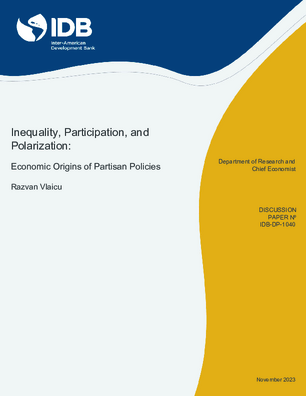Inequality, Participation, and Polarization: Economic Origins of Partisan Policies
Date
Nov 2023
The upward co-movement of income inequality and partisan polarization in the United S is typically attributed to intensified class conflict or a political wealth bias. This paper formalizes a theory of polarization where changes in the income distribution do not affect citizens' policy preferences, but instead change their patterns of political participation: aggregate voting decreases relative to aggregate giving, reducing the electoral penalty for partisan policies. By endogenizing party composition, the model captures both the ideological and compositional dimensions of polarization, and addresses less-discussed polarization features, such as intra-party homogeneity and the increase in safe seats. According to the model, observed polarization patterns imply that parties have diverged more than candidates, and that the gap between party and candidate divergence has increased with income inequality.




